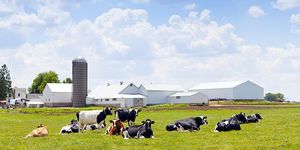FEEDD Act Seeks Feed Emergency Flexibility
 A proposal to give livestock farmers flexibility in dealing with weather-related feed emergencies has been introduced in the House of Representatives. The Feed Emergency Enhancement During Disasters Act (FEEDD Act) was co-sponsored by U.S. Reps. Angie Craig (D-Minnesota) and Dusty Johnson (R-South Dakota). It would give farmers and ranchers additional emergency flexibility to help alleviate feed concerns, as well as promote conservation in years of excessive moisture, flooding and drought.
A proposal to give livestock farmers flexibility in dealing with weather-related feed emergencies has been introduced in the House of Representatives. The Feed Emergency Enhancement During Disasters Act (FEEDD Act) was co-sponsored by U.S. Reps. Angie Craig (D-Minnesota) and Dusty Johnson (R-South Dakota). It would give farmers and ranchers additional emergency flexibility to help alleviate feed concerns, as well as promote conservation in years of excessive moisture, flooding and drought.
Under the Federal Crop Insurance Program, producers who are unable to plant a crop due to adverse conditions are eligible to receive a small indemnity (55% of their guarantee), but are prohibited from growing a cash commodity due to a missed window in the growing season. They can plant a cover crop, but there is a prohibition on haying and grazing before Nov. 1. Producers can also elect to hay or graze the cover crop, but must take another discount on their indemnity (35% of their guarantee), although the forage value is far less than a commodity crop.
 The FEEDD Act would create an emergency waiver authority for the secretary of agriculture to allow for haying, grazing or chopping of a cover crop before Nov. 1 in the event of a feed shortage due to excessive moisture, flood or drought without producers taking a further discount on their crop insurance. Additionally, this legislation will provide emergency forage for personal use or donation for family farmers and ranchers when devastating weather hits, and enhance the overall farm safety net for diversified crop and livestock producers.
The FEEDD Act would create an emergency waiver authority for the secretary of agriculture to allow for haying, grazing or chopping of a cover crop before Nov. 1 in the event of a feed shortage due to excessive moisture, flood or drought without producers taking a further discount on their crop insurance. Additionally, this legislation will provide emergency forage for personal use or donation for family farmers and ranchers when devastating weather hits, and enhance the overall farm safety net for diversified crop and livestock producers.Dairy farmers facing potential feed shortages are lining up in support of the FEEDD Act.
John Rettler, FarmFirst Dairy Cooperative president and dairy farmer from Neosho, Wisconsin, welcomed the proposal.
“After the spring season we’ve just experienced, this legislation is welcome to allow farmers the chance to make the most of what they can of this growing season,” he said. “Feed inventories were greatly diminished with the excessive flooding earlier this spring. Whatever inventories dairy and beef farmers had built up over the past few years became pretty valuable after the weather we had late last year. The slow and incredibly wet start to this planting and growing season didn’t help matters either.”
Rettler, who used locally sourced distillers grains when his own feed supplies became low and before more hay could be chopped from the field, said the proposal also provides conservation benefits.
“Additionally, using cover crops and hay and grazing methods will help prevent soil erosion during flood conditions, protecting from excessive nutrients entering main waterways and improving overall soil health in our croplands,” he said. “Essentially, this legislation is a win-win for everyone and needed at a time like now.”
An officer with Edge Dairy Farmer Cooperative, agreed.
“Our cooperative represents dairy farms throughout the Upper Midwest, and many of them are struggling to get a crop in and are concerned about what the feed outlook is for the coming year,” said Mitch Davis, treasurer of Edge and general manager of Davis Family Dairies in south-central Minnesota. “The FEEDD Act will give dairy farmers and other livestock producers much needed flexibility as we work through the challenges caused by an unusually wet spring.”
Citing a “rapidly emerging forage crisis for livestock farmers across the Midwest,” a multistate coalition of agricultural organizations previously submitted a written request to USDA Secretary Sonny Perdue, seeking approval for emergency provisions allowing the planting and harvesting of forages on prevented plant acres without date restrictions. (Read: Efforts underway to head off a looming ‘forage disaster.’)
Read also: FAQs: Perdue addresses Market Facilitation Program payments and ‘prevent plant’ policy.
Source: Dave Natzke, Progressive Dairyman
